最新上海牛津英语5B语法知识点复习
上海牛津英语5B复习

5B 知识点梳理 Module3
Unit 1 了解几种常见标志的英文表达及其在日常
生活中的应用。 掌握情态动词 can ,must, should 的用法:
You can’t ride your bicycle here. It means we mustn’t swim. 掌握句型: You can’t ….
Let’s review
.
5B 知识点梳理 Module1
Unit1了解并掌握学习用品类的单词。 掌握人称代词的不同形式,并根据句子的意思,正确使用人称
代词。 掌握Whose … is this/that? Whose …are these/ those? 的句
型,以及他们的回答。 4) Whose school bag is this? It’s __________.(mine, ours, his, hers, ours, theirs)
Right.正确! What els. e?还有呢?
5B 知识点梳理 Module4
Unit 1 了解各种博物馆的英文表达。 掌握句型:Which museum do you want …? Why?
Because … What did you see there?
Unit 2 了解西方节日,它们都在什么时候,有什么风俗习惯。
What is the temperature? What was the temperature?
.
Module3
Unit 3
了解并掌握有关家具类的单词。 掌握方位介词: under, next to, behind,
on …. 掌握句型: Let’s … Are there any
changes …? The sofa was… Now it’s …. 4) 了解上海的变化。 Sounds fun.听起来很有趣。 Yes, let’s do that.好的,我们就那样做吧。 You’re right.你说对了。
牛津小学英语5B_期末复习资料
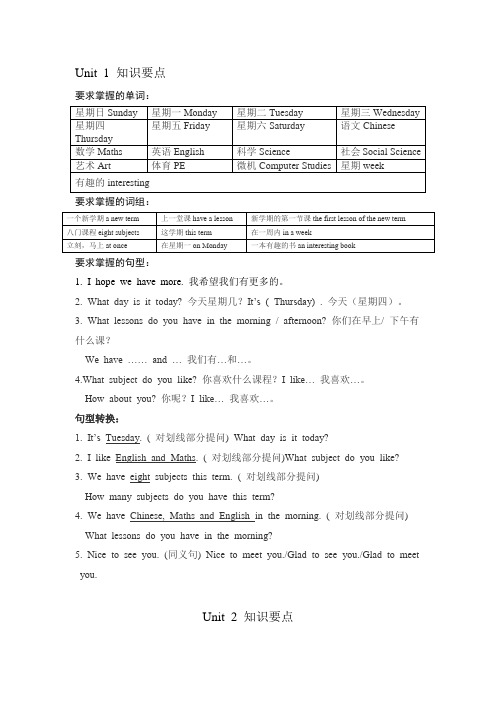
Unit 1 知识要点要求掌握的单词:要求掌握的词组:要求掌握的句型:1. I hope we have more. 我希望我们有更多的。
2. What day is it today? 今天星期几?It’s ( Thursday) . 今天(星期四)。
3. What lessons do you have in the morning / afternoon? 你们在早上/ 下午有什么课?We have …… and …我们有…和…。
4.What subject do you like? 你喜欢什么课程?I like…我喜欢…。
How about you? 你呢?I like…我喜欢…。
句型转换:1. It’s Tuesday. ( 对划线部分提问) What day is it today?2. I like English and Maths. ( 对划线部分提问)What subject do you like?3. We have eight subjects this term. ( 对划线部分提问)How many subjects do you have this term?4. We have Chinese, Maths and English in the morning. ( 对划线部分提问) What lessons do you have in the morning?5. Nice to see you. (同义句) Nice to meet you./Glad to see you./Glad to meet you.Unit 2 知识要点要求掌握的单词:要求掌握的词组:要求掌握的句型:1. Why are you absent today?你今天为什么缺席?(相当于Why are you not here today?)2. See you soon. 一会见。
(word完整版)上海牛津英语5B语法知识点复习,推荐文档
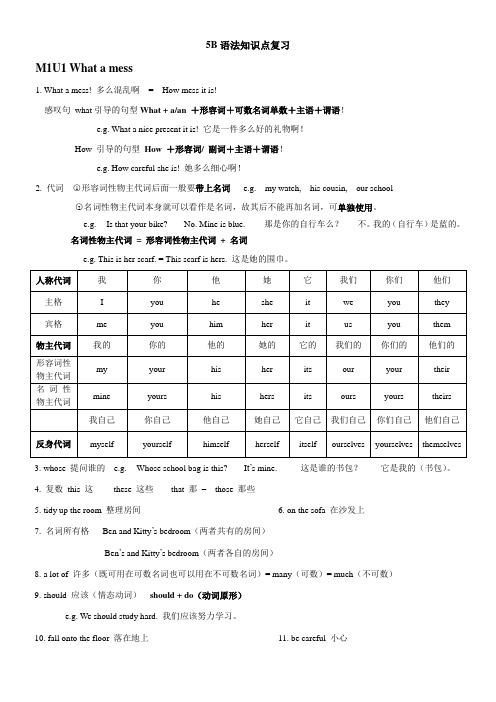
5B语法知识点复习M1U1 What a mess1. What a mess! 多么混乱啊= How mess it is!感叹句what引导的句型What + a/an +形容词+可数名词单数+主语+谓语!e.g. What a nice present it is! 它是一件多么好的礼物啊!How 引导的句型How +形容词/ 副词+主语+谓语!e.g. How careful she is! 她多么细心啊!2. 代词○1形容词性物主代词后面一般要带上名词 e.g. my watch, his cousin, our school○2名词性物主代词本身就可以看作是名词,故其后不能再加名词,可单独使用。
e.g. -- Is that your bike? -- No. Mine is blue. -- 那是你的自行车么?-- 不。
我的(自行车)是蓝的。
名词性物主代词= 形容词性物主代词+ 名词e.g. This is her scarf. = This scarf is hers. 这是她的围巾。
3. whose 提问谁的 e.g. -- Whose school bag is this? -- I t’s mine. -- 这是谁的书包?-- 它是我的(书包)。
4. 复数this 这- these 这些that 那–those 那些5. tidy up the room 整理房间6. on the sofa 在沙发上7. 名词所有格Ben and Kitty’s bedroom(两者共有的房间)Ben’s and Kitty’s bedroom(两者各自的房间)8. a lot of 许多(既可用在可数名词也可以用在不可数名词)= many(可数)= much(不可数)9. should 应该(情态动词)should + do(动词原形)e.g. We should study hard. 我们应该努力学习。
最新沪教版小学英语5B单词、句型、知识点归纳
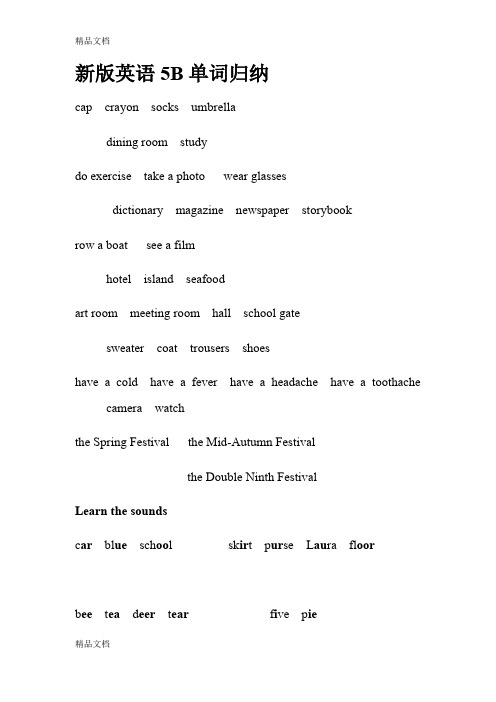
新版英语5B单词归纳cap crayon socks umbrelladining room studydo exercise take a photo wear glassesdictionary magazine newspaper storybookrow a boat see a filmhotel island seafoodart room meeting room hall school gatesweater coat trousers shoeshave a cold have a fever have a headache have a toothache camera watchthe Spring Festival the Mid-Autumn Festivalthe Double Ninth FestivalLearn the soundsc ar bl ue sch oo l sk ir t p ur se L au ra fl oorb ee t ea d eer t ear f i ve p ieFl o g oa t J oe t oy n oi seh air Cl are b ear m ou se ow l M ay w ai t新版英语5B句型归纳Are they yours? Yes, they are.\ No, they aren’t.Why do you like it? Because it’s so big.I’ll be a teacher. I won’t wear glasses.I’m going to read a story every day.What are you going to do this weekend?Where will we stay?How long will we stay in Sanya?First, they’ll visit our classroom.Which dress do you like, the blue one or the pink one?You should take some medicine. You shouldn’t go to bed late.People can tell the time anywhere.The Spring Festival comes in January or February every year. What a mess! \Do you know why? \Don’t wait until tomorrow. It’s your size.\What’s wro ng with you?\Let me have a look. Have a good rest and you’ll get well soon.What shall we do?Really?新版英语5B知识点总结1、let's tidy it up.Whose cap is this? It's mine.Whose socks are these? They are Paul's.Can you put it on his bed? Sure.Thank you for your help, Sally.You're welcome, Peter.Peter is tidying up the bedroom. Who is tidying up the bedroom? Jimmy sees a small box on the table. It's full of nails.All the nails fall on the floor.Jimmy's father gives him a black stone.2、Why do you like it? Because it's so big.Wild geese have busy lives. They fly from one place to another. They change homes twice every year.There is an old woman. She gives the children some bread, and then she says, it's time to go to bed.Do you like Nancy's home or Dan's home?Laura wants to buy a new skirt. The old one is too small.3、I'll be a teacher.I won't wear glasses.Kitty wants to know about her future. She stands in front of a magic machine and takes a photo.I am good at Maths, but I am weak in English.I do not like to get up early, so I have no time for breakfast. I’m often late for school. I do not like sport and I get tired easily. I like watching TV. In the future, I will study hard and I will read more English books. I will try to get up early and have breakfast.I will not be late for school any more. I will do exercise every day. I will not watch too much TV.4、I'm going to read a story every day.The students in Class5A are going to make posters about the best sto ries for children.The Lis are at the bookshop.5、What are you going to do this weekend?I'm going to stay at home and watch TV with my grandparents.I don't have any plans for the weekend.6、What are we going to do this summer?How do we get there? We get there by plane.Where will we stay? We’ll stay in a hotel by the sea.How long will we stay in Sanya? We’ll stay there for five days. What will we do there?Sanya has beautiful beaches with clear water. We’ll go swimming there. We’ll also have seafood. The seafood there tastes great.7、The Open Day is on 30th April. Ms Guo is asking the children about the day.First,they’ll visit our classroom.Next, they’ll visit the art room.Then, they’ll go to the hall.After that, they’ll go to the library.Finally, they’ll meet the teachers in the meeting room.Ms Guo takes the parents to the classroom. She tells them about the lessons.The children show their parents some beautiful pictures.They have tea and cakes with the teachers in the meeting room.In the UK, schools often have Parents’Evenings. It is a time for teachers and parents to talk.8、Which dress do you like, the blue one or the pink one?I like the pink one. You can try both on. I’ll try on the trousers.One day, a man visits him with some nice clothes.The emperor puts on the “new clothes” and gives the man a lot of money.People keep quiet.9、You should take some medicine.You shouldn’t go to bed late.What’s wrong with you? I have a headache/have a cold.have a fever have a headache have a toothachehave a look have a good rest get wellWhat’s the date today?It’s the fifth of May.10、People can travel from one place to anther very fast.One day, they are watching some birds flying in the sky. They want to fly too.11、The Spring Festival comes in January or February every year. On Chinese New Year Eve, families have a bid dinner together. Children often get red packets with some money in them.People also watch fireworks at night.12、A giant lives in a big house with a beautiful garden.She does not bring any to the giant’s garden.They bring Miss Spring to his garden.The giant looks at his garden and feels sad.He’s not kind to children.The giant knocks down the wall around his garden. Miss Spring never comes late again.。
牛津小学英语5B语法点归纳

牛津小学英语5B语法点归纳牛津小学英语5B语法点归纳牛津小学英语5B语法点归纳:1.2.3.4.5.6.7.8.Like+动名词如:likeswimmingLike+名词的复数如:likemasksgo+动名词如:goclimbingHowmany+名词复数如:howmanywatchesdifferent+名词复数如:differentcountriesSame前加the,后面一般跟单数,如:thesamehobby序数词前一定加the,如:thefirstday在几点用at,如at7o’clock,在某一天或某一天的具体时间段用on,如:onSunday,onSundaymorning,直接在早上、下午或晚上用in,如:inthemorning9.动词后代词用宾格(动宾)如:joinme10.介词后代词用宾格(介宾)如:withhim,toher11.wantto+动原,wouldliketo+动原,sorryto+动原,forgetto+动原,it’stimeto+动原,12.情态动词can后面加动原,let后加动原13.祈使句中动词用原形,否定句在句首加Don’t14.助动词(dodoesdon’tdoesn’t)后动词用原形15.形容词加名词(形名)如:abeautifulgirl16.动词加副词(动副)如:dancebeautifully17.Some用于肯定句,any用于否定句18.Therebe结构就近原则如:Thereisateacherandsomestudentsintheclassroom.19.不可数名词:watercoffeeteamilkjuicebreadrice foodfruitpaperchocolateexercisefish20.乐器前加the,球类前不加the,(playthe乐器,play 球类)如:playthepiano,playfootball21.Who当作特殊的第三人称单数1.Listen,Jim__________(sing)anEnglishsonginthemusi croom.2.WangBing____________(like)(make)modelships.3.I__ _________(live)inNanJing,butmyfriend(live)inEngland.4.Myfather(like)(read)newspaper,butmymother(not)5.It’stwoo’clockintheafternoon.We_________(have) anEnglishclassnow.6.Ilike__________(sing),she_________(like)________ _(dance).7.WhatHelenoften(do)attheweekends?She often(catch)insects.8.He__________(donot)want(eat)breadforbreakfast.9. I_______(have)afriend.Hername______(be)Susan.She_____( like)singinganddancing10.__________YangLing(have)(some)hobbies?Yes,she.11.Where(be)HelenandTomfrom?They(be)from(American)?12.Sheusually__________(go)shoppingwithhermother.13.What’s(Nan cy)hobby?She(like)(grow)flowers.14.MrSmith__________(come)fromAustralia.Hespeaks(E ngland).15.Look,They__________(play)footballintheplayground.16.__________(do)yoursister(watch)TVeveryday?No,she.17.LiuTaocan(swim)(good).(he)mothercan(dance)(beautiful).18.Ioftengo__________(swim)onSu ndayafternoon.Butmymother(go)(shop)19.(Nancy)parents(be)from(Japanese).They’reJapane se(visit).20.Howmany(child)arethereinyourclass?There(be)thirty.21.Achicken(have)two(foot).22.I’dlike__________(b uy)some(peach)inthesupermarket.23.Let(we)(help)(she)with(she)homework.(good).24.We__________(want)(go)(fish).25.__________you__ ________(skate)now?No,I(write)ane-mailto(I)friend.26.There(be)somemilkinthebottle.27.There(be)some(butterfly)and(dragonfly)inthepark.28.What(be)(you)mother(do)now?She(cook)inthekitchen.29.Iwantto__________(buy)someinterestingbooksatthe bookshop30.There(be)some(knife)and(fork)inthecupboard.31.I(like)(ski).Ican(ski)32.LiuTaoandWangBingusually__________(run)afterschool.Look,they(run)intheplaygr ound.33.Thisis(she)book.Those(be)(they)(book).34.Today(be)(teacher)Day.These(card)arefor(they).35.Iwant__________(write)alettertomyf riend.Heis(Australia).36.(be)there(some)breadinthefridge?No,there.37.Todayisthe__________(one)dayofthenewterm.38.Thereany(student)intheclassroom.They(paly)volleyballnow.39.MumandI__________(have)(same)hobby.40.Shallwe__ ________(go)tothecinemabybike?Allright.41.________(do) yourfriends(visit)yourfamilyeveryweek?No,they__________(do).42.What_(be)oneplusfour?It’sfive.43.show(they)how(darw)firefly)44.Who(be)ondutytoday?附加题:Where(be)mygloves?They(be)therejustnow.Ican’tfind(it).扩展阅读:牛津小学英语5B 语法点归纳5B语法点归纳班级姓名知识点1.Like+动名词如:likeswimming2.Like+名词的复数如:likemasks3.go+动名词如:goclimbing4.Howmany+名词复数如:howmanywatches5.Different(不同)+名词复数如:differentcountries6.same前加the,后面一般跟单数,如:thesamehobby7.序数词前一定加限定词,如the,如:thefirstday8.在几点用at,如at7o’clock。
沪教版小学牛津英语5b英语知识点梳理(含听力材料)
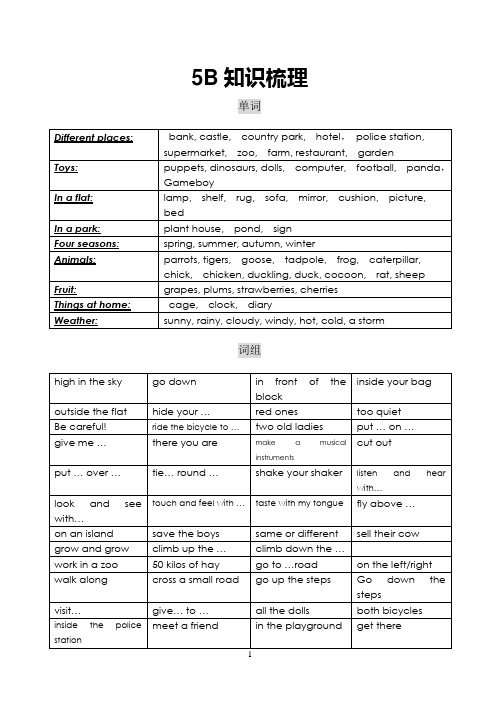
5B知识梳理单词词组主要句型和语法点1.介词:behind, beside, inside, on的用法2.to be 句型:肯定句,否定句,一般疑问句,特殊疑问句及其它们的回答1)Where is it /are they?2)Is it…?3)Whose …is this/are these?4)What time…?5)Whose are/is …?6)What colour …?7)Where’s it now?3.can的句型:肯定句,否定句,一般疑问句,特殊疑问句及其它们的回答1)Can you see? – Yes, I can. No, I can’t.2)What can…?3)…can’t….4.祈使句:8)Be careful/quiet!9)Draw …10)Put …5.形容词1)soft, fluffy, shiny, warm,2)new, small, big, loud, quiet,3)same, different,4)colours5)Seasons6)wet, sunny, cloudy, dry6.连词:and7.名词性的物主代词的用法:mine, yours, his, hers, theirs, ours,8.时间表达法:1)at … o’clock2)in the morning/afternoon3)five past/to one4)nine fifteen/ a quarter past nine9.指示和问路:How can I get to…/How can I get there?10.to do 句型:肯定句,否定句,一般疑问句,特殊疑问句及其它们的回答1)Do you want…?2)Which … do you like?11.have got句型:1)What have you got?2)Who has got…?12.both, all的用法both 两者都,all三者以上,后面所跟名词必须是复数,both rulersall the rulers13.一般过去时: 肯定句,否定句,一般疑问句,特殊疑问句及其它们的回答1)Where was Sam?He was….He wasn’t…Was he….? No, he wasn’t. Yes, he was.2)There was a cat.3)He cut the rice last year.He didn’t cut the rice….Did he cut the rice…..?Yes, he did. No, he didn’t.What did he cut last year?日常会话1.Sorry!2.Excuse me! Ok! You are welcome! Yes, it is. No, it isn’t3.Hello!4.I don’t know. Thank you very much!5.Good night!6.What time is it?。
牛津小学英语5B知识点(全)
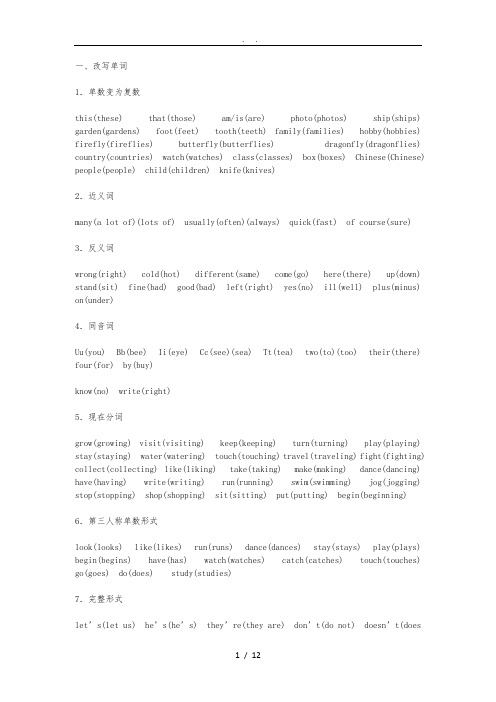
一、改写单词1.单数变为复数this(these) that(those) am/is(are) photo(photos) ship(ships) garden(gardens) foot(feet) tooth(teeth) family(families) hobby(hobbies) firefly(fireflies) butterfly(butterflies) dragonfly(dragonflies) country(countries) watch(watches) class(classes) box(boxes) Chinese(Chinese) people(people) child(children) knife(knives)2.近义词many(a lot of)(lots of) usually(often)(always) quick(fast) of course(sure)3.反义词wrong(right) cold(hot) different(same) come(go) here(there) up(down) stand(sit) fine(bad) good(bad) left(right) yes(no) ill(well) plus(minus) on(under)4.同音词Uu(you) Bb(bee) Ii(eye) Cc(see)(sea) Tt(tea) two(to)(too) their(there) four(for) by(buy)know(no) write(right)5.现在分词grow(growing) visit(visiting) keep(keeping) turn(turning) play(playing) stay(staying) water(watering) touch(touching) travel(traveling) fight(fighting) collect(collecting) like(liking) take(taking) make(making) dance(dancing) have(having) write(writing) run(running) swim(swimming) jog(jogging) stop(stopping) shop(shopping) sit(sitting) put(putting) begin(beginning)6.第三人称单数形式look(looks) like(likes) run(runs) dance(dances) stay(stays) play(plays) begin(begins) have(has) watch(watches) catch(catches) touch(touches) go(goes) do(does) study(studies)7.完整形式let’s(let us) he’s(he’s) they’re(they are) don’t(do not) doesn’t(doesnot) I’ve(I have) can’t(can not)8.名词所有格Ben(Ben’s)Mike(Mike’s) Su Yang(Su Yang’s) Helen(Helen’s)9.主格his(he) her(she) me(I) them(they) your(you) us(we)10.宾格she(her) he(him) I(me) you(you) they(them) we(us) it(it)二、改写句子1.对画线部分提问It’s half past ten. (What time is it?)The students are in the sprots hall. (Where are the students?)My uncle likes growing flowers. (What does your uncle like doing?)I feel better now. (How do you feel now?)I’ve got a high fever. (What’s wrong with you?)I come from Japan. (Where do you come from?)She is from China. (Where is she from?)The girl in red is my sister. (Which girl is your sister?)Tom comes from the USA.(Who comes from the USA?)2.改为一般疑问句I’m taking some medicine. (Are you taking any medicine?)She feels very tired. (Does she feel tired?)I want to fly a kite. (Do you want to fly a kite?)The boy is standing. (Is the boy standing?)He lives in a small town. (Does he live in a small town?)They can play the piano. (Can they play the piano?)3.改为否定句My mother is taking some medicine. (My mother isn’t taking any medicine.) She can mak e clothes. (She can’t make clothes.)He works from Monday to Friday. (He doesn’t work from Monday to Friday.) They’re buying food in the shop. (they aren’t buying food in the shop.) They play table tennis every day. (They don’t play table tennis every d ay.) That is Jan’s umbrella. (改为同义句)That umbrella is Jan’s.It’s time to have breakfast. (改为同义句)It’s time for breakfast./It’s time for having breakfast.Who is absent today? (改为同义句)Who is not here today?I’m going to the library now. (改为祈使句)Don’t go to the library now.The man puts the plate on his finger. (改为现在进行时)The man is putting the plate on his finger.They are our good friends. (改为单数形式)He is my good friend.They usually do housework on Sundays. (改为单数形式)He usually does housework on Sunday.三、连词成句think, is, today, Saturday, I (.) (I think today is Saturday.) you, can, me, tell (?) (Can you tell me?)I, to, go, China, hope, I, can (.) (I hope I can go to China.) this, subject, you, do, what, like, term (?)(What subject do you like this term?)lesson, it, the, new, the, of, term, is first (.)(It is the first lesson of the new term.)is, stamps, he, showing, to, friends, his, his (.)(He is showing his stamps to his friends.)she, does, making, like, ships, model (?)(Does she like making model ships?)with, what’s, you, wrong (?) (What’s wrong with you?)have, lessons, I, in, four, the, morning (.)(I have four lessons in the morning.)goes, from, he, Friday, to, Monday, school, to (.)(He goes to school from Monday to Friday.)subjects, study, what, he, at, does, school (?)(What subjects do you study at school?)hobby, stamps, is, Ben’s, collecting (.)(Ben’s hobby is collecting stamps.)you, in, what, do, lessons, the have, morning (?)(What lessons do you have in the morning?)you, why, absent, are, today (?) (Why are you absent today?) left, right, Ton, three, turn, times, and (.)(Turn left and right three times, Tom.)you, touch, your, your, head, can, with, hands(?)(Can you touch your head with your hands?)lie, do, on, not, your, back(.)(Do not lie on your back.) putting, the, is man, on, the, apple, finger, his (.)(The man is putting the apple on his finger.)are, the, lesson, students, where, having, a PE (?)(Where are the students having a PE lesson?)fingers, many, does, how, the, have, monkey (?)(How many fingers does the monkey have?)has, a, David, day, busy (.) (David has a busy day.)a, game, basketball, this, there, evening, is (.)(There is a basketball game this evening.)what, it, is, time, now, Ben(?) (What time is it now,Ben?) you, thirsty, feel, do (?) (Do you feel thirsty?)begins, English, at, to, fifteen, our, lesson, ten (.)(Our English lesson begins at fifteen to ten.)like, Mike, does, to, English, speak (?)(Does Mike like to speak English?)same, Tom, are, Jason, From, country, the and (.) (Tom and Jason are from the same country.)are, the, Miss, talking, Wang, students, to (.) (The students are talking to Miss Wang.)want, do, New York, you, go, to, around (?)(Do you want to go around New York?)teaches, he, in, school, English, a, primary (.) (He teaches English in a primary school.)it, today, what, is day(?) (What day is it today?) is, think, interesting, I, English (.)(I think English is very interesting.)us, meet, come, and, here(.)(Come here and meet us.) an, , he, writing, is, his, teacher, to (.)(He is writing an to his teacher.)四、中译英(一)词组1 在周一上午(on Monday morning)2读英语(read English)3上一节美术课(have an Art lesson)4一节有趣的课(an interesting lesson)5上更多的课(have more lesson)6每天(every day)7马上(at once)8午饭后(after lunch)9感到很热(feel hot)10重感冒(a bad cold)11.休息(have a rest)12看医生(see a doctor)13吃一些药(take some medicine)14感到好些了(feel better)15在周三(on Wednesday)16星期四下午(Thursday afternoon)17七门科目(seven subjects)18在一周(in a week)19对…说话(speak to…)20打给我(call me)21患了咳嗽(get a cough)22怎么了(what’s wrong)23在学校(at school)24呆在床上(stay in bed )25错误(wrong number )26拍照(take photos )27集邮(collect stamps)28一位老同学(an old classmate)29一艘轮船(a ship )30购物(go shopping)31种树(grow the trees)32听音乐(listen to music)33出示…给…(show to… )34看一看(have a look)35养金鱼(keep goldfish)36一封(an )37同龄(the same age)38在一个小镇上(in a small town)39一封给我姐姐的信(a letter to my sister) 40居住(live in)41小房子(a small house)42从…到…(from…to…)43安静地坐(sit quietly)44在我家附近(near my home)45做衣服(make clothes)46上学(go to school)47放学后(after school)48做运动(do sports)49一动物邮票(an animal stamp)50拍照(take photos)51养狗(keep dogs)52相同的爱好(the same hobby)53写歌曲(write music)54上网(surf the Internet)55足球踢得好(play football well)56快速地停(stop quickly )57在每周六(on every Saturday)58读报(read newspaper)59浇花(water flowers)60打乒乓球(play table tennis)61弹钢琴(play the piano)62照看(look after)63仔细听(listen carefully)64抬起你的右腿(lift up your right leg)65向左转十次(turn left ten times)66上下跳两次(jump up and down two times)67把他们移到教室(move them to the classroom) 68站成四排(stand in four lines)69发出命令(give orders)70把你的手放在一起(put your hands together) 71弯曲你的膝盖(bend your knees)72做一些早锻炼(do some morning exercise)73在他的背上(on his back)74在体育课上(at a PE lesson)75在体育馆里(in the sports hall)76碰你的手臂(touch your arm)77抬起(lift up)78仰躺(lie on one’s back)79做家庭作业(do one’s homework)80做家务(do housework)81刷牙(brush teeth)82洗脸(wash face)83在八点半(at half past eight)84值日(on duty )85十点三刻(a quarter to eleven)86让我们快点(let’s hurry)87忙碌的一天(a busy day)88十点十分(ten past ten)89没有时间休息(have no time for rest)90从早到晚(from morning to night)91吃一些面包(have somebread)92谈论他们的家庭(talk about their family)93当然(of course)94从书中学到很多(learn a lot from the book) 95搬运一只红色的盒子(carry a red box)96捉蚂蚁(catch ants)97去跑步(go running)98度周末(spend weekends)99团队合作(group work )100在夜间发光(glow at night)101英语俱乐部(the English club)102不同的国家(different countries)103喜欢旅游(live traveling )104一个美国男孩(an American boy)105说法语(speak French)106长城(the Great Wall)107园林(the gardens in Su Zhou)108与…交谈(talk to…)109三个中国男孩(three Chinese boys)110在日本(in Japan)111儿童俱乐部(the Children’s club)112一位忙碌的参观者(a busy visitor)113访问澳大利亚(visit Australia)114一只勇敢的蚂蚁(a brave ant)115一法国地图(a map of France)116去爬山(go climbing )117捉昆虫(catch insects)118游览中国(go around China)119试着…(try to… )120在周末(at the weekends)(二)句子1、小男孩正站在他父亲的肩膀上。
牛津沪教版小学英语五年级下册知识点总结
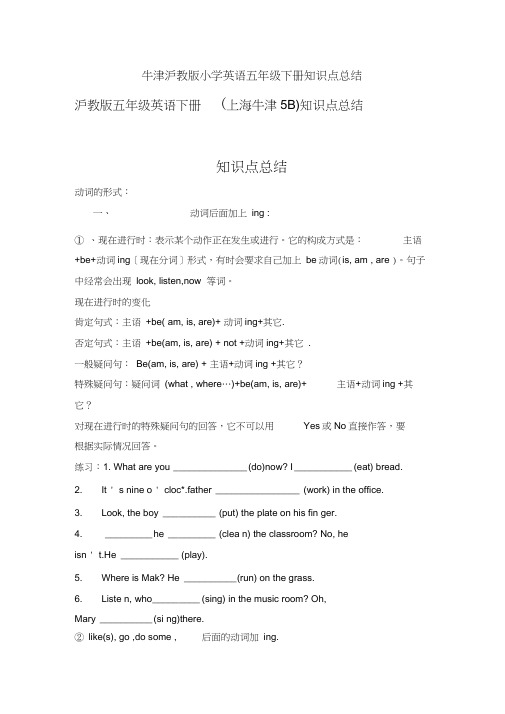
牛津沪教版小学英语五年级下册知识点总结沪教版五年级英语下册(上海牛津5B)知识点总结知识点总结动词的形式:一、动词后面加上ing :①、现在进行时:表示某个动作正在发生或进行。
它的构成方式是:主语+be+动词ing〔现在分词〕形式,有时会要求自己加上be动词(is, am , are )。
句子中经常会出现look, listen,now 等词。
现在进行时的变化肯定句式:主语+be( am, is, are)+ 动词ing+其它.否定句式:主语+be(am, is, are) + not +动词ing+其它.一般疑问句:Be(am, is, are) + 主语+动词ing +其它?特殊疑问句:疑问词(what , where…)+be(am, is, are)+ 主语+动词ing +其它?对现在进行时的特殊疑问句的回答,它不可以用Yes或No直接作答,要根据实际情况回答。
练习:1. What are you ______________ (do)now? I ___________ (eat) bread.2. It ' s nine o ' cloc*.father ________________ (work) in the office.3. Look, the boy __________ (put) the plate on his fin ger.4. _________ he _________ (clea n) the classroom? No, heisn ' t.He ___________ (play).5. Where is Mak? He __________ (run) on the grass.6. Liste n, who _________ (sing) in the music room? Oh,Mary __________ (si ng)there.②like(s), go ,do some , 后面的动词加ing.如:1.1 like (play ) football, but my father likes (play) chess.2. ____________ Let ' s go wim).二、动词后面加s/es.这就有关一种时态:一般现在时。
牛津译林5B语法归纳及词形转换复习(可编辑修改word版)

牛津译林 5B 语法归纳及词形转换复习一、语法点归纳:1.Like + 动名词如:like swimming2.Like + 名词的复数如:like masks(面具)3.go + 动名词如:go climbing4.How many + 名词复数如:how many watches5.different + 名词复数如:different countries6.Same 前加the , 后面一般跟单数,如:the same hobby7.序数词前一定加the ,如:the first day8.在几点用at, 如at 7 o’clock ,在某一天或某一天的具体时间段用on , 如:on Sunday, on Sunday morning, 直接在早上、下午或晚上用in,如:in the morning9.动词后代词用宾格(动宾)如:join me10.介词后代词用宾格(介宾)如:with him ,to her11.want to +动原,would like to + 动原,sorry to + 动原,forget to +动原,it’s time to + 动原,12.情态动词can 后面加动原,let 后加动原13.祈使句中动词用原形,否定句在句首加Don’t14.助动词(do does don’t doesn’t)后动词用原形15.形容词加名词(形名)如:a beautiful girl16.动词加副词(动副)如:dance beautifully17.Some 用于肯定句,any 用于否定句18.There be 结构就近原则如:There is a teacher and some students in theclassroom.19.不可数名词:water coffee tea milk juice bread rice food fruit paper chocolate exercise fish20.乐器前加the, 球类前不加the, (play the 乐器,play 球类)如:play the piano, play football21.Who 当作特殊的第三人称单数二、改写单词1.单数变为复数this(these) that(those) am/is(are) photo(photos) ship(ships)garden(gardens) foot(feet) tooth(teeth)family(families) hobby(hobbies) firefly(fireflies)butterfly(butterflies) dragonfly(dragonflies) country(countries)watch(watches) class(classes) box(boxes) Chinese(Chinese)people(people) child(children) knife(knives)2.近义词many(a lot of)(lots of) usually(often)(always) quick(fast)of course(sure)3.反义wrong(right) cold(hot) different(same) come(go) here(there)up(down) stand(sit) fine(bad) good(bad) left(right)yes(no) ill(well) plus(minus) on(under)4.同音词Uu(you) Bb(bee) Ii(eye) Cc(see)(sea) Tt(tea) two(to)(too) their(there)four(for) by(buy) know(no) write(right)5.现在分词1、grow(growing) visit(visiting) keep(keeping) turn(turning) play(playing)stay(staying)water(watering)touch(touching)travel(traveling) collect(collecting)2、like(liking)take(taking) make(making)dance(dancing)have(having)write(writing)3、run(running)swim(swimming)jog(慢走jogging)stop(stopping)shop(shopping) sit(sitting) put(putting) begin(beginning)6.第三人称单数形式look(looks) like(likes) run(runs) dance(dances) stay(stays)play(plays) begin(begins) have(has) watch(watches) catch(catches)touch(touches) go(goes)do(does) study(studies)7.完整形式let’s(let us) he’s(he’s)they’re(they are) don’t(do not) doesn’t(does not) I’ve(I have)can’t(can not)8.名词所有格Ben(Ben’s)Mike(Mike’s) Su Yang(Su Yang’s)Helen(Helen’s)9.主格his(he) her(she) me(I) them(they) your(you) us(we)10.宾格she(her) he(him) I(me) you(you) they(them) we(us) it(it)。
沪教版五年级英语下册(上海牛津5B)知识点总结
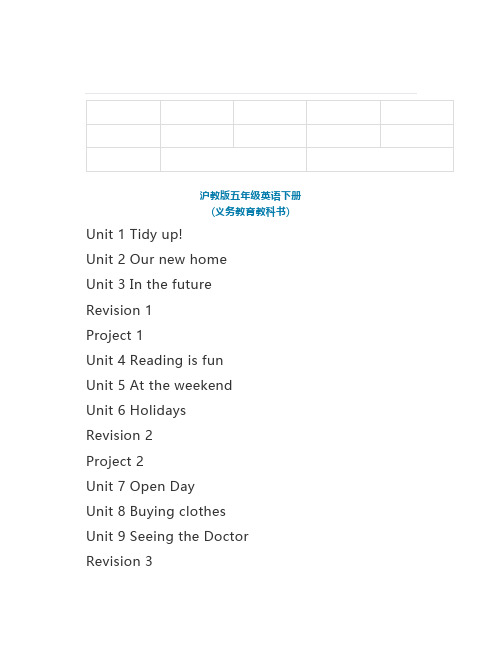
沪教版五年级英语下册(义务教育教科书) Unit 1 Tidy up!Unit 2 Our new homeUnit 3 In the futureRevision 1Project 1Unit 4 Reading is funUnit 5 At the weekendUnit 6 HolidaysRevision 2Project 2Unit 7 Open DayUnit 8 Buying clothesUnit 9 Seeing the Doctor Revision 3Project 3Unit 10 Great inventionsUnit 11 Chinese festivalsUnit 12 The giant‘s gardenProject 4知识点总结动词的形式:一、动词后面加上ing :①、现在进行时:表示某个动作正在发生或进行。
它的构成方式是:主语+be+动词ing〔现在分词〕形式,有时会要求自己加上be动词(is, am , are )。
句子中经常会出现look, listen,now……等词。
现在进行时的变化肯定句式:主语+be( am, is, are)+动词ing+其它.否定句式:主语+be(am, is, are) +not +动词ing+其它. 一般疑问句:Be(am, is, are) +主语+动词ing +其它?特殊疑问句:疑问词(what , where…)+be(am, is, are)+主语+动词ing +其它?对现在进行时的特殊疑问句的回答,它不可以用Yes或No直接作答,要根据实际情况回答。
练习:1. What are you _________(do)now? I___________(eat) bread.2. It’s nine o’clock.. Myfather_______________(work) in the office.3. Look, the boy____________(put) the plate on his finger.4. __________he__________(clean) the classroom? No, he isn’t.He____________(p lay).5. Where is Mak? He___________(run) on the grass.6. Listen, who___________(sing) in the music room? Oh, Mary___________(sing)there.②like(s), go ,do some , 后面的动词加ing.如:1. I like (play ) football, but my father likes (play) chess.2.Let’s go (swim).二、动词后面加s/es. 这就有关一种时态:一般现在时。
牛津5B知识点语法点汇总复习资料
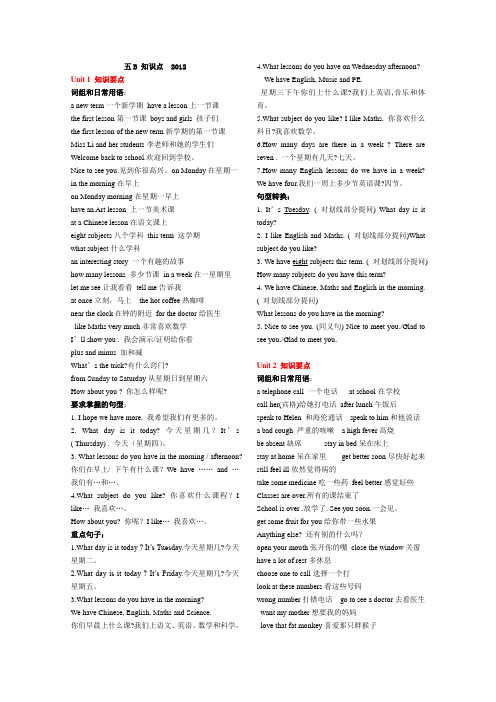
五B 知识点 2012Unit 1 知识要点词组和日常用语:a new term一个新学期have a lesson上一节课the first lesson第一节课boys and girls 孩子们the first lesson of the new term新学期的第一节课Miss Li and her students李老师和她的学生们Welcome back to school.欢迎回到学校。
Nice to see you.见到你很高兴。
on Monday在星期一in the morning在早上on Monday morning在星期一早上have an Art lesson 上一节美术课at a Chinese lesson在语文课上eight subjects八个学科this term 这学期what subject什么学科an interesting story 一个有趣的故事how many lessons 多少节课in a week在一星期里let me see让我看看tell me告诉我at once立刻,马上the hot coffee热咖啡near the clock在钟的附近for the doctor给医生like Maths very much非常喜欢数学I’ll show you . 我会演示/证明给你看plus and minus 加和减What’s the trick?有什么窍门?from Sunday to Saturday从星期日到星期六How about you ? 你怎么样呢?要求掌握的句型:1. I hope we have more. 我希望我们有更多的。
2. What day is it today? 今天星期几?It’s ( Thursday) . 今天(星期四)。
3. What lessons do you have in the morning / afternoon? 你们在早上/ 下午有什么课?We have ……and …我们有…和…。
牛津译林5B语法归纳及词形转换复习

牛津译林5B语法归纳及词形转换复习一、语法点归纳:1. Like + 动名词女如: like swimming2. Like +名词的复数女如: like masks(面具)3. go + 动名词女口:go climbing4. How many + 名词复数女口:how many watches5. different + 名词复数女口:different countries6. Same前加the ,后面一般跟单数,如:the same hobby7. 序数词前一定加the ,如:the first day8. 在几点用at,女口at 7 o' clock ,在某一天或某一天的具体时间段用on,如:on Sun day, on Sun day morning, 直接在早上、下午或晚上用in,女口:in the morning9. 动词后代词用宾格(动宾)如:join me10. 介词后代词用宾格(介宾)如:with him ,to her11. want to + 动原, would like to + 动原,sorry to + 动原,forget to + 动原,it' s time to + 动原,12. 情态动词can后面加动原,let后加动原13. 祈使句中动词用原形,否定句在句首加Don' t14. 助动词(do does don' t doesn ' t)后动词用原形15. 形容词加名词(形名) 女口: a beautiful girl16. 动词加副词(动副) 女口:dance beautifully17. Some用于肯定句,any用于否定句18. There be 结构就近原贝卩如: There is a teacher and some students in the classroom.19. 不可数名词:water coffee tea milk juice bread rice food fruit paper chocolate exercise fish20. 乐器前加the,球类前不加the, (play the乐器,play球类)如:play the piano, play football21. Who当作特殊的第三人称单数二、改写单词1.单数变为复数this(these) that(those) am/is(are) photo(photos) ship(ships) garde n( garde ns) foot(feet) tooth(teeth)。
牛津英语5B Module one语法总结
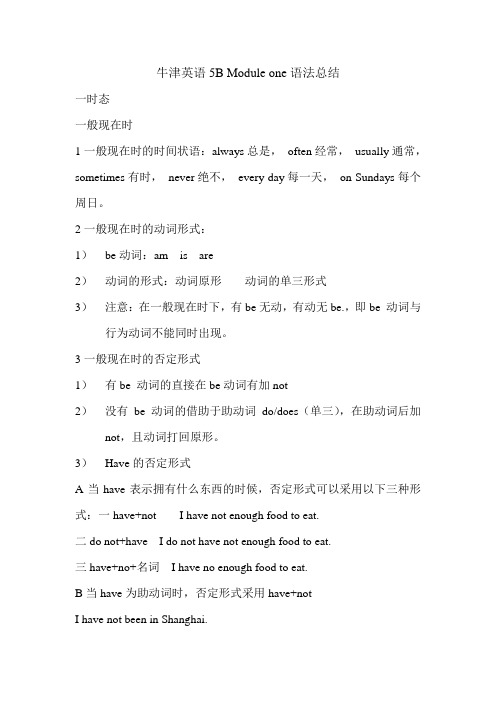
牛津英语5B Module one语法总结一时态一般现在时1一般现在时的时间状语:always总是,often经常,usually通常,sometimes有时,never绝不,every day每一天,on Sundays每个周日。
2一般现在时的动词形式:1)be动词:am is are2)动词的形式:动词原形动词的单三形式3)注意:在一般现在时下,有be无动,有动无be.,即be 动词与行为动词不能同时出现。
3一般现在时的否定形式1)有be 动词的直接在be动词有加not2)没有be 动词的借助于助动词do/does(单三),在助动词后加not,且动词打回原形。
3)Have的否定形式A当have表示拥有什么东西的时候,否定形式可以采用以下三种形式:一have+not I have not enough food to eat.二do not+have I do not have not enough food to eat.三have+no+名词I have no enough food to eat.B当have为助动词时,否定形式采用have+notI have not been in Shanghai.C当have既不表示拥有,也不是助动词时,如have breakfast,否定形式采用do not+have I did not have breakfast last morning.4一般现在时的一般疑问句形式1)有be 动词的把be 动词提前。
2)没有be 动词的借助助动词do/does,将助动词提前,且动词打回原形5一般现在时的特殊疑问句形式特殊疑问词+一般疑问句二方位1in front of 在前面(不在其中)The tree is in front of the classroom. in the front of在前部(在其中)The blackboard is in the front of the classroom.2方位介词On在上面(接触物体)above 在。
上海版新牛津英语5B-M2U2-Snow-White知识讲解

films on at City
Cinema. Kitty and Mum want to see
. And
Ben will see
next tபைடு நூலகம்me. The film is on at two
o'clock. They buy
tickets first.Two
and
one
.The film starts in five minutes.
The Mirror says,'Snow White is in the forest.' The queen goes there.She lookslike an old woman. She givesa big red apple to Snow White. She tastes it and falls asleep. Snow White cannot wake up . One day, a prince comes and help Snow White.
Now , kitty, Ben and Mum are watching the film
'Snow White'.
Is the girl nice? She is a fair girl. She is like a princess. She is Snow White.
a fair wltaeodamychaenr
What do you look like? I look like ... my fmbsairsothtteherer r
is my good friend. He/She is ... He/She likes... He/She looks like... He/She is a nice boy/girl.
英语上海牛津试用本5B语法总结
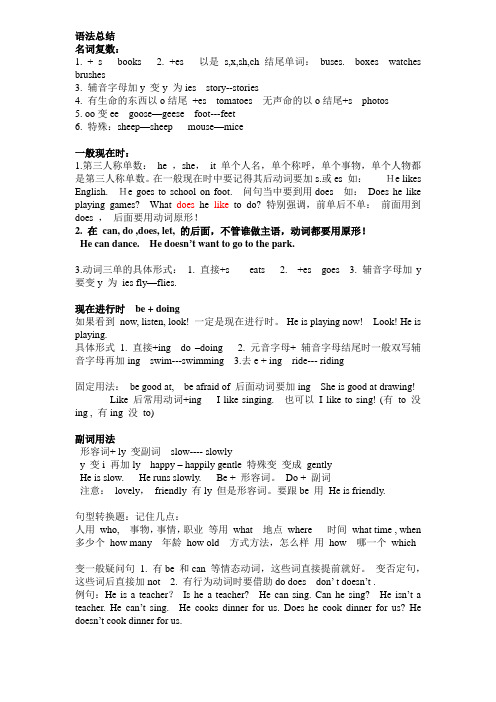
语法总结名词复数:1. + s books2. +es 以是s,x,sh,ch 结尾单词:buses. boxes watches brushes3. 辅音字母加y 变y 为ies story--stories4. 有生命的东西以o结尾+es tomatoes 无声命的以o结尾+s photos5. oo变ee goose—geese foot---feet6. 特殊:sheep—sheep mouse—mice一般现在时:1.第三人称单数:he ,she,it 单个人名,单个称呼,单个事物,单个人物都是第三人称单数。
在一般现在时中要记得其后动词要加s.或es 如:He likes English. He goes to school on foot. 问句当中要到用does 如:Does he like playing games? What does he like to do? 特别强调,前单后不单:前面用到does ,后面要用动词原形!2. 在can, do ,does, let, 的后面,不管谁做主语,动词都要用原形!He can dance. He doesn’t want to go to the park.3.动词三单的具体形式:1. 直接+s eats 2. +es goes 3. 辅音字母加y 要变y 为ies fly—flies.现在进行时be + doing如果看到now, listen, look! 一定是现在进行时。
He is playing now! Look! He is playing.具体形式1. 直接+ing do –doing 2. 元音字母+ 辅音字母结尾时一般双写辅音字母再加ing swim---swimming 3.去e + ing ride--- riding固定用法:be good at, be afraid of 后面动词要加ing She is good at drawing!Like 后常用动词+ing I like singing. 也可以I like to sing! (有to 没ing , 有ing 没to)副词用法形容词+ ly 变副词slow---- slowlyy 变i 再加ly happy – happily gentle 特殊变变成gentlyHe is slow. He runs slowly. Be + 形容词。
- 1、下载文档前请自行甄别文档内容的完整性,平台不提供额外的编辑、内容补充、找答案等附加服务。
- 2、"仅部分预览"的文档,不可在线预览部分如存在完整性等问题,可反馈申请退款(可完整预览的文档不适用该条件!)。
- 3、如文档侵犯您的权益,请联系客服反馈,我们会尽快为您处理(人工客服工作时间:9:00-18:30)。
5B语法知识点复习M1U1 What a mess1. What a mess! 多么混乱啊= How mess it is!感叹句what引导的句型What + a/an +形容词+可数名词单数+主语+谓语!e.g. What a nice present it is! 它是一件多么好的礼物啊!How 引导的句型How +形容词/ 副词+主语+谓语!e.g. How careful she is! 她多么细心啊!2. 代词○1形容词性物主代词后面一般要带上名词 e.g. my watch, his cousin, our school○2名词性物主代词本身就可以看作是名词,故其后不能再加名词,可单独使用。
e.g. -- Is that your bike? -- No. Mine is blue. -- 那是你的自行车么?-- 不。
我的(自行车)是蓝的。
名词性物主代词= 形容词性物主代词+ 名词e.g. This is her scarf. = This scarf is hers. 这是她的围巾。
3. whose 提问谁的 e.g. -- Whose school bag is this? -- I t’s mine. -- 这是谁的书包?-- 它是我的(书包)。
4. 复数this 这- these 这些that 那–those 那些5. tidy up the room 整理房间6. on the sofa 在沙发上7. 名词所有格Ben and Kitty’s bedroom(两者共有的房间)Ben’s and Kitty’s bedroom(两者各自的房间)8. a lot of 许多(既可用在可数名词也可以用在不可数名词)= many(可数)= much(不可数)9. should 应该(情态动词)should + do(动词原形)e.g. We should study hard. 我们应该努力学习。
10. fall onto the floor 落在地上11. be careful 小心12. give sb. sth. = give sth. to sb. 给某人某物13. pick up 捡起M1U2 Watch it grow1. 一般过去时定义:表示过去某个时间里发生的动作或存在的状态。
(关键)just now,yesterday,last week,this morning等。
构成:主语+动词的过去式+其他动词过去式的变化规则:○1一般在动词原形末尾加ed e.g. play - played,listen - listened,want – wanted,enjoy – enjoyed○2结尾是e的动词,加d e.g. live - lived,like - liked,taste - tasted○3辅音字母+y结尾的动词,变y为i,再加ed e.g. study - studied,cry - cried○4末尾只有一个辅音字母的重读闭音节词,双写这个辅音字母,再加ed e.g. stop - stopped,plan - planned○5不规则变化am/is - was,are - were,have – had,come – came,become – became,make – made,eat – ate,put – put 2. an interesting insect 一种有趣的昆虫 3. a green caterpillar 一条绿色的毛毛虫4. like eating leaves 喜欢吃叶子like doing sth.喜欢(做)某事5. a brown cocoon 一个棕色的茧子6. make a lot of silk 产许多的蚕丝7. come out 出来8. lay eggs 产蛋9. cry in my bed 在我的床上哭泣10. born 出生be born in, on等,表示“出生的时间,地点”e.g. Little Justine is born in a river 小贾斯汀出生在一条河里。
I was born on May 5,in Shanghai.我在5月5日出生于上海。
11. catch flies/catch a fly 抓苍蝇12. First – Next – Then – Finally 首先–其次–然后–最后M1U3 How noisy1. 动词过去式不规则变化:do – did,hear – heard,sit – sat,can – could2. want to read a book 想要读一本书want to do sth.想要做某事3. sit on the sofa 坐在沙发上4. watch a cartoon 看动画片5. at City Square 在城市广场6. enjoy the loud music 喜欢喧闹的音乐7. have a great fun 玩得愉快8. play sth. for sb. = play sb. sth. 为某人表演(演奏)9. loud – louder(比较级)- loudest (最高级)表示两者“比较”时用比较级,结构为:比较级+tha n,表示“xx比xxx更……”形容词比较级的构成规则:○1一般在词尾加er e.g. taller,longer,stronger,younger○2字母e结尾,只加r e.g. late-later,nice-nicer○3以辅音字母+y结尾,变y为i,再加er e.g. heavy-heavier○4双写末尾的辅音字母,再加er e.g. fat-fatter,thin-thinner,big-bigger○5双音节和多音节词的比较级,在原级前加more e.g. more beautiful,more careful○6不规则变化 e.g. good-better,many / much-more,far-farther,bad / ill-worse三个或三个以上的人或物进行比较,用形容词最高级结构为:the + 形容词最高级+in/of等表示范围的短语,表示“最……”。
e.g. He wants to hear the loudest noise in the world. 他想听到世界上最大的噪声。
10. must 必须(情态动词)must + do(动词原形)11. after that 从那以后12. become quiet 变得安静了M2U1 Food and drinks1. have… for breakfast 为早餐准备了。
2. sound healthy 听起来健康3. either 表示也,通常只用于否定句,且要放在句末 e.g. I don’t know, either. 我也不知道。
too 表示也,一般用在肯定句中,放在句末 e.g. I am going to see the film, too. 我也正打算去看电影。
4. sth. is important = It’s important to do sth.e.g. Breakfast is important.(早餐是重要的。
)= It’s important to have breakfast. (吃早餐很重要。
)5. favourite ... = like … beste.g. Apples are my favourite food. (苹果是我最喜欢的食物) = I like apples best. (我最喜欢苹果。
)6. keep … away 远离……,离……远一点 e.g. An apple a day keeps the doctor away! 一天一苹果,医生远离我! sb. keep sth./sb. away某人离某物/某人远一点e.g. We must keep the matches away from the fire. 我们必须使这些火柴远离火烛。
keep sb./sth. (away) from sth./sb.让……远离……e.g. Keep the child away from the barking dog. 让这小孩离那只狂叫的狗远一些。
7. 名词复数tomato – tomatoes ; potato – potatoes ; mango – mangoes (芒果) ; hero – heroes (英雄)8. 反义词healthy – unhealthy 健康–不健康; happy – unhappy 高兴–不高兴9. in the fridge 在冰箱里10. a hole in the wall 墙上一个洞11. do some exercise做一些锻炼exercise 不可数名词.(身体或脑部的)活动,锻炼,运动 e.g. take exercise 锻炼身体可数名词.(保持健康或培养技能的)一套动作,训练活动,练习 e.g. do morning exercises 做早操12. sth. happen to sb. 表示某人出了某事(常指不好的事发生在某人身上)"e.g. What happened to you? = What was wrong / the matter with you? 你怎么啦?sb. happen to do sth. 表示某人碰巧做某事13. in the end 最后M2U2 Films1. shall作为助动词,一般用于第一人称Ⅰ和We,表示一个将来的动作,构成将来时。
Shall后面接动词原形。
e.g. We shall have a good time in the park. 我们在公园里会玩得很高兴的.Shall 用于第一人称,表示征求对方的意愿。
e.g. What shall we do this evening? 今晚我们能做什么?2. There are three films on at City Cinema. 在城市影院有三部电影在上映。
句意有两个部分,第一部分要断在on,即:there are three films on - 有三部电影在上映(be on - 上映);第二部分at city cinema - 在城市影院3. which 提问哪一个,哪一些 e.g. Which one do you want to see? 你想看哪一个?4. next time 下一次5. leave home 离开家6. ticket office售票处7. start in five minutes在五分钟内开场8. have a look看一看9. a magic mirror一面魔法镜子10. take…into a forest 带…进入一个森林11. fair – fairest公平的–最公平的12. fall asleep入睡13. wake up醒过来14. find out找到15. 反义词fall asleep - wake up 入睡- 醒过来; entrance – exit入口–出口M2U3 School subjects1. what about (doing) sth. = how about (doing) sth.2. It's time to do sth = it's time for +名词 e.g. It's time for class. = It's time to have class.3. have a short break稍作休息= have a rest4. from … to …表示从…至…;从…到… e.g. Lunch is from eleven to two. 从十一点到两点开午饭。
